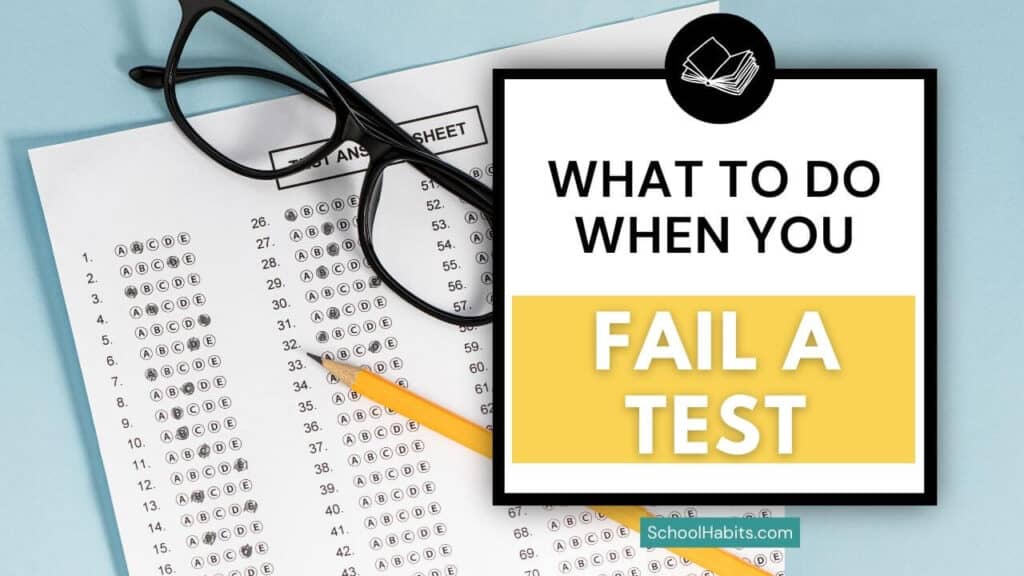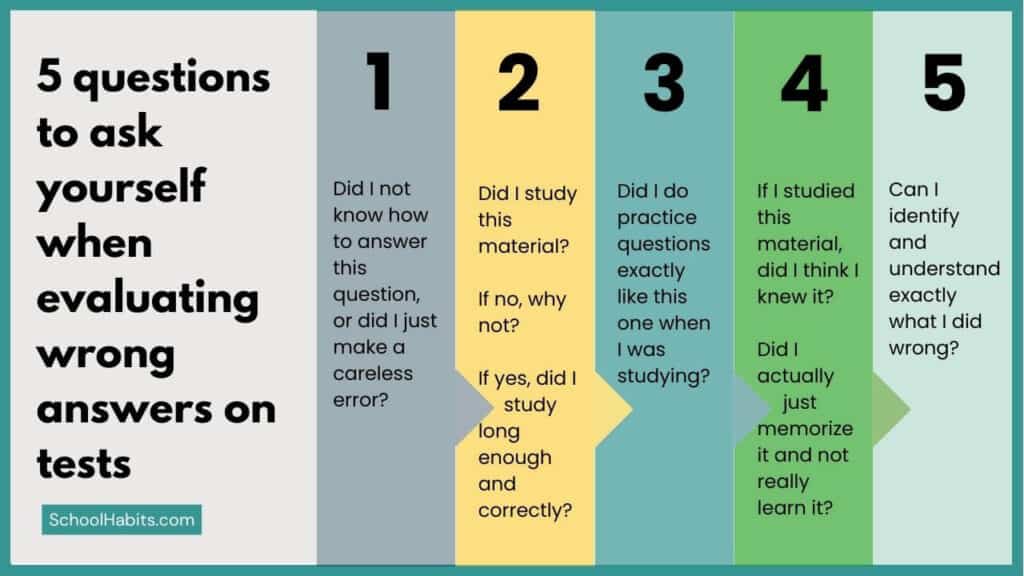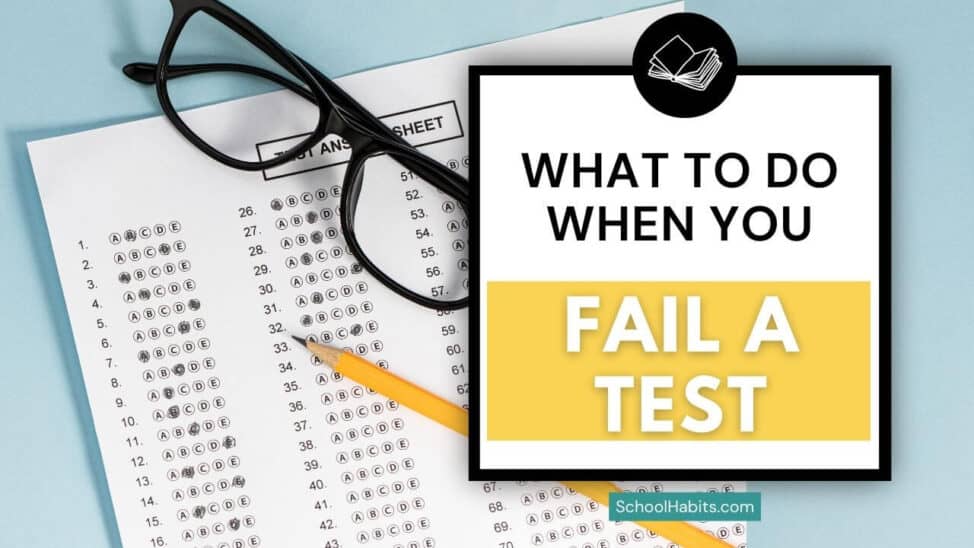
By Katie Azevedo, M.Ed.
So, you failed a test. That stinks and I know you feel crummy. I’ll bet you want to throw the test in the trash, but before you do, hear me out: After the emotional dust settles, but before you move on to the next subject, it’s important that you dig in and figure out what went wrong.
If you don’t figure out what went wrong, you’ll find yourself in the same situation over and over again. In this blog post, I teach you what to do when you fail a test so that you …well, stop failing tests.
What To Do When You Fail a Test
As much as a failed test stinks, it can also provide you with important feedback about something you need to improve. And yes, in most cases a failed test means you need to improve something. I know, I know … it’s easier to think it was the test’s fault or the teacher’s fault … and maaaaybe this might sometimes be true. But let’s be real: most failed tests are a result of something you did or didn’t do.
I suggest taking the following four steps when you fail a test.
If you’re consistently failing multiple tests in a semester, then you need slightly different strategies; I address that at the end of this post.
1. Do a post mortem.
Post-mortem is another word for autopsy. In real life, this is the process of examining a dead body to determine the cause of death. In the context of school, it’s the process of examining a failed test to determine the cause of the failure.
You might wonder if there’s any point to doing a post-mortem, especially if the class is already moving onto the next unit, but here are two reasons you should never skip this step:
- If the teacher allows retakes on failed tests, doing a post-mortem will ensure that you don’t fail the retake.
- The content on your failed test will likely appear again on your midterm or final, and you will use your old tests and quizzes to prepare for those exams. You don’t want to study the wrong answers from a test you failed.
To do a post-mortem, I suggest looking at each question you got wrong (or each place you lost points) and ask yourself the following questions:
A. Did I not know how to answer this question, or did I just make a careless error?
It’s important to start here because there’s only one lesson to be learned from careless errors: slow down and check your work. If you lost a lot of points from careless mistakes, then learn this lesson and move on. On the other hand, if you lost points because you didn’t know how to answer the question, then there’s a bigger lesson to be learned: study differently.
B. Did I study this material?
Look at the questions you got wrong and ask yourself if you studied that material. Be honest. If you did study it but still got the question wrong, perhaps you didn’t learn the material well enough to apply the information. It’s one thing to be able to regurgitate material, but it’s another thing to be able to use it to answer a question.
If you didn’t study the material, why not? Did you not think it was on the test? Did you just forget to study it? What can you do next time to make sure that you’re studying the right things? Remember, before you study for any test, you need to a) figure out what’s on the test, b) organize your study materials, and c) make a study guide. If you didn’t study the right material, then figure out which of those steps (a, b or c) went wrong.
C. Did I do practice questions exactly like this one when I was studying?
When studying for content that involves processes, formulas or rules (usually math, science, ELA grammar, or foreign languages), you need to study by doing practice questions like the ones that will be on your test. You should do more practice questions than you think is reasonable, because that’s how you get to the point of being able to do them flawlessly on the real test.
I suggest you make practice quizzes with these questions, and take a practice test on most days during the week leading up to your test. In this tutorial, I teach you exactly how to make your own quizzes, including where to get the questions to put on them.
D. If I studied this material, did I think I knew it?
When I do post-mortems with students, they often tell me “but I studied that! And I knew it!” So, here’s the thing. I know this is a frustrating scenario, but one of two things is really going on here:
a. You only studied to the point of memorization, not learning. Memorizing material is dangerous because we fool ourselves into thinking we know it – but we don’t. When we cram-study right before a test, the material is just loosely floating around our short-term memory: this is not a permanent storage container, and we’re nearly guaranteed to forget the content in a few hours or less. You have to use spaced repetition to go from memorized to learned. Here’s my full tutorial with instructions for going beyond memorization.
b. You may have failed your test because you thought you knew the content – because you were using passive study methods. If there’s only one take-away you get from this What To Do When You Fail a Test blog post, it should be this one: only ever use active recall study methods. Here is my complete active recall tutorial.
E. Can I identify and understand exactly what I did wrong?
Look at the questions you got wrong, and look at your answer. Can you identify where you made the mistake? Maybe you misunderstood the question and thought it was asking something else. Maybe you answered only part of the question. Maybe your answer started off okay but then you made a mistake along the way. Once you identify the exact point of breakdown, then you can redo your answer correctly.
Why take the time to answer the question again? See the two reasons I gave you at the beginning of this post.

2. Meet with your teacher.
Try to do your post-mortem by yourself before you meet with your teacher. But if you’re unable to answer any of the post-mortem questions I listed above, then definitely meet with your teacher.
Email your teacher ahead of time or speak with them after class to set up a time to meet. Pre-planning a meeting time is better than popping in unannounced after school, expecting them to be there and available.
To your teacher meeting, bring your failed test and any work that you’ve done on your post-mortem questions. The preparation you do ahead of time will increase how helpful your teacher will be.
3. Make a concrete plan for next time.
In most cases, a failed test is a result of studying the wrong material, not studying enough (you must use spaced repetition), or studying the wrong way (not using active recall). A post-mortem will help you identify where your study efforts went wrong so that you can do something different next time. The following ideas should get you started making some changes:
- In this tutorial, I teach you exactly how to study for a test over 5 days using my Ultimate 5-Day Study Plan. You can also download and use my free study planner right here. Those two resources will help you space out your study sessions so that you’re not cramming/memorizing the night before.
- If you feel like you’re already studying a lot, here’s how to study less.
- Here are 5 signs you’re studying wrong, in case you need more evidence.
- And if you’re in college, here are my top 12 study tips for college students.
4. Let go and move on.
You failed. That stunk. But because you know what to do when you fail a test, you did a post-mortem, met with your teacher, and made a better study plan for your next test. Awesome. Now it’s time to let go and move on. Everyone fails. I failed a chemistry test in college because I got so nervous that I literally disintegrated the test with sweat from my hands (and tears!). Why did I get so nervous? Because I hadn’t studied properly and I knew it.
We fail. We get up. We try again. If that’s a challenge for you, then please please read this post about the top 3 student mindsets of top-performing students.

